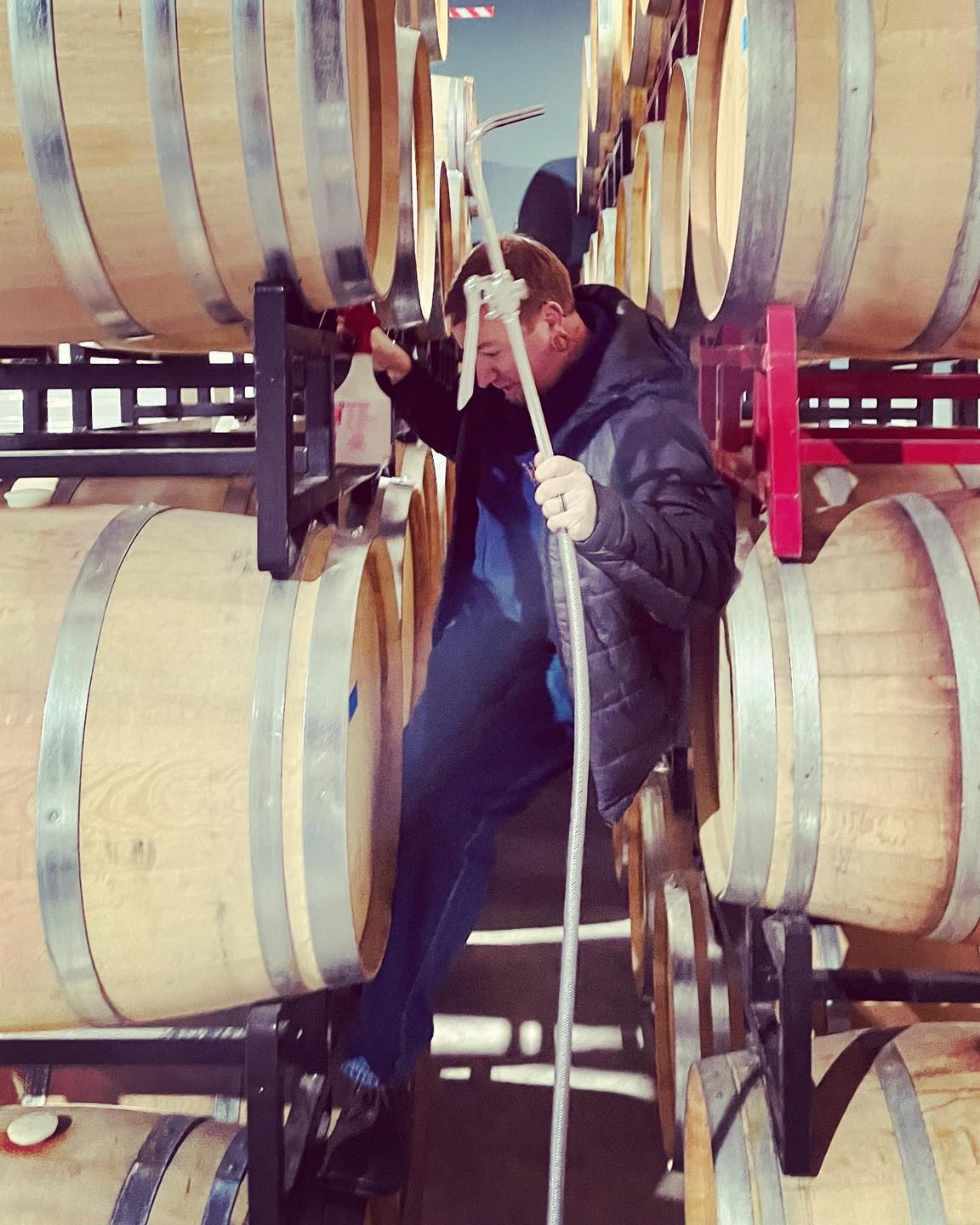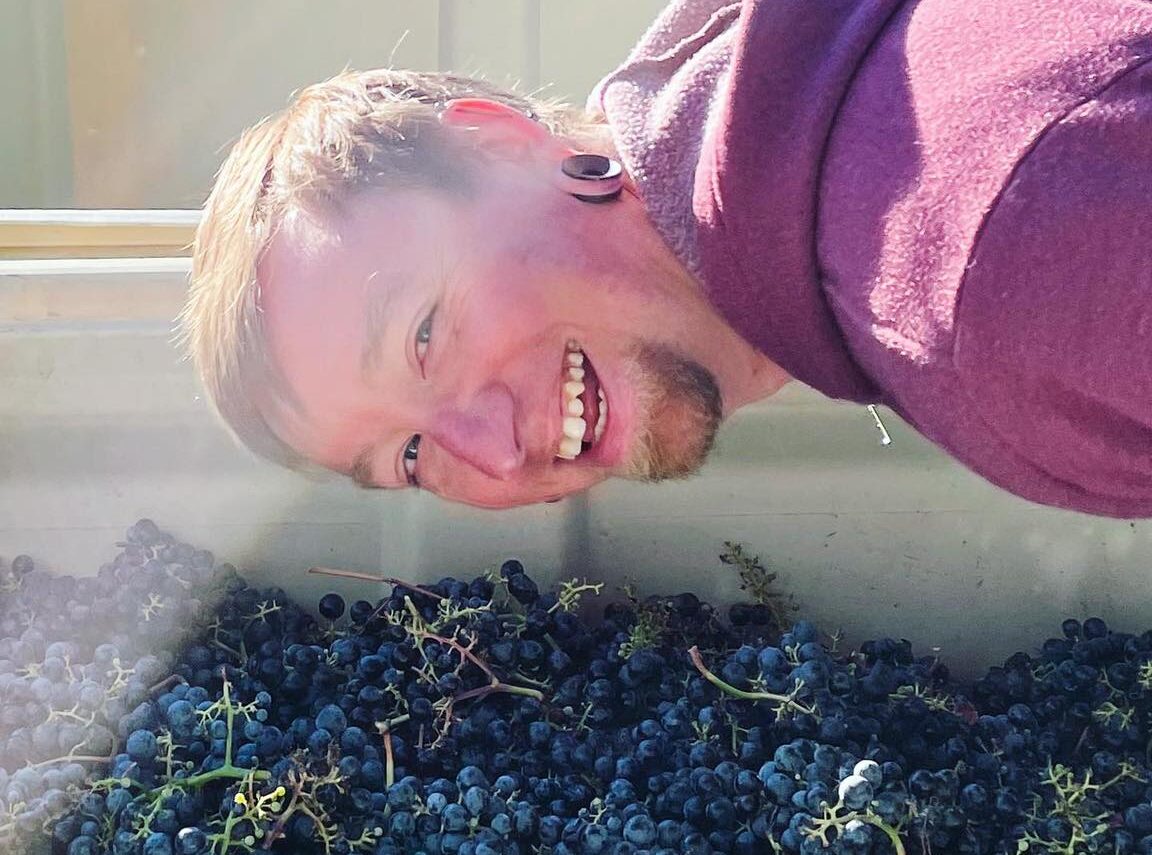In It Together: an interview with Jason Fox of Lagana Cellars by Alicia Mehling
Jason Fox, co-owner/winemaker of Lagana Cellars in Walla Walla shares his fondness for the camaraderie of the Washington wine industry and his love of white wines.

Alicia Mehling: Give us a little bit of background on who you are and what you do currently.
Jason Fox: I moved here from Indiana back in 2011 and graduated in 2013. Cowinemaker/coowner at Lagana Cellars. I founded the winery in ’13 when I was graduating and Todd Bernave, the other partner, joined me in 2017. I focused on whites originally and he’s all reds. He wasn’t white until he met me.
AM: How did you get into wine?
JF: I came in through food. I used to be a sous chef in Indiana. My front of house bar manager was getting higher and higher in the somm track, so when he took his level two somm, he ended up moving to Seattle so I found this program here and moved out with him. So I came from the food side. I didn’t want to be a bartender or somm. I’d still rather be back of house, as it were, and in production.
AM: Is there someone in the EV world that you admire, including fellow EV alums?
JF: All the ones that have started wineries, and not just working in cellars. Like Prospice. They are making more than I am. They are killing it. The person I admire the most is Tim Donahue. He is the one who grew my love for whites. I was probably the only person in class who wanted to make whites, and he was like ‘do it!’. And I would go to his office afterwards and he would give me papers to read and all kinds of cool stuff. He’s the one who got me where I am.
AM: What’s special to you about working in the wine industry?
JF: For Walla Walla specifically, it’s so friendly and cordial. Everyone helps each other out. The quote from Leonetti is “we push the people in front of us and pull the one’s behind us.” If we all help each other, then we all make a better industry. Like when they started the program, that was the point. To train people who can go into the industry and make it better.
AM: What is your favorite part of your job?
JF: The winemaking itself, especially the whites. But talking to people is fun too. I bullsh*t them a lot. Drop a lot of F bombs, that’s my style. Talking to people who enjoy your wines, I like that.
AM: What are some of the challenges you’ve faced in the industry?
JF: I think our main challenge is selling enough because we have this tasting room [downtown Walla Walla], we have basically no distribution, because we’re at the point where we are big enough to sell DTC pretty well and we sell quite a bit of wine out here and we’re growing the wine club. But in terms of getting restaurant placements and any distribution, you have to make three to four times as much to make the same amount of money. Why would we do that? Why would we make 4000 cases to make the same amount of money as you would making 2000 cases? It makes no sense. People always ask if they can find my stuff in Spokane, and I’m like ‘you don’t, because I have no distributor to bring stuff to Spokane’. I’m not going to make 4000 cases to get into those markets. It’s not worth it. So, I’ll just keep selling here.
AM: What do you think differentiates and excites you about Washington wine?
JF: We have a huge spectrum of stuff people are doing. You can do anything from cool climate whites to full-bodied, warm climate reds. It’s such a large spectrum. We don’t have flags planted in anything. Napa has Cab and Chardonnay. People forget about Pinot Noir. There is a lot of Pinot Noir in Napa Valley. And bubbles! They don’t think about that when you say ‘Napa’. They think Cab and Chardonnay. Not Washington. No, we’re like ‘we do everything’. But also because we buy from all over the place. We’re not stuck with an estate vineyard that has Cab Franc, Cab Sauv, and Syrah, and that’s it. I can buy Pinot from the Hills. I can buy Riesling from Sagemoor. I can do whatever I want because I don’t have an estate vineyard. We’re totally flexible in Washington.
AM: How do you foresee climate change or social issues affecting the local industry in the next few years?
JF: Social issues. We’ve had that for awhile and we just ignored it. Same with climate change. It’s going to hit us hard pretty soon. There’s a lot of changes in labor laws. Obviously immigration reform is happening. COVID did not help in terms of labor. We’re planning to see fruit prices increase at least 20-30% if not 50% in the next 3-5 years. Plus we have inflation right now too. They’re gonna have to raise prices because of labor. They now have to pay overtime. They have to do more mechanization because they can’t get enough people to work on the agricultural side. Climate change is absolutely happening. We’ve had six of the hottest years in the last decade. It’s been crazy. Last year obviously killed the fruit tonnage with how hot it was. It’s absolutely happening. Everyone wants to not do a damn thing about it on the political side. We have to do things here.
AM: What are some up-and-coming trends in wine that you’re following?
JF: Bubbles are becoming huge. Like legitimate bubbles. I wish I had made one a couple years ago, then I would have been on trend. I’m like I can’t do it now because I’ll be falling the trend like a freaking… What do you call them? But bubbles for sure. There’s not a lot of bubbles around.
AM: What advice can you share with future EV graduates?
JF: Don’t make too much too fast. That seems to be the downfall of most new wineries in town. They’ll come out with 400 cases their first year. Where are you gonna sell 400 cases? Because you’re a small nobody. It’s not easy. Stay small. Grow organically.


Join the Conversation